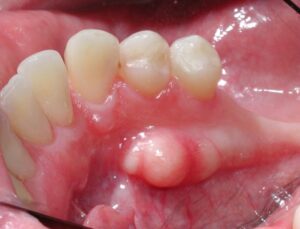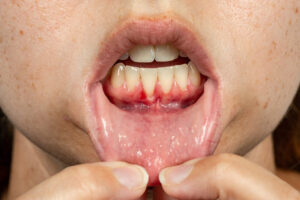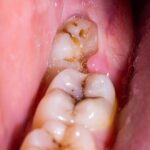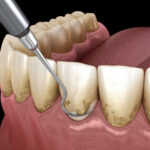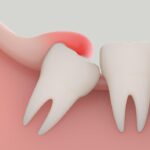Scalloped Tongue: Complete Guide to Rippled Tongue
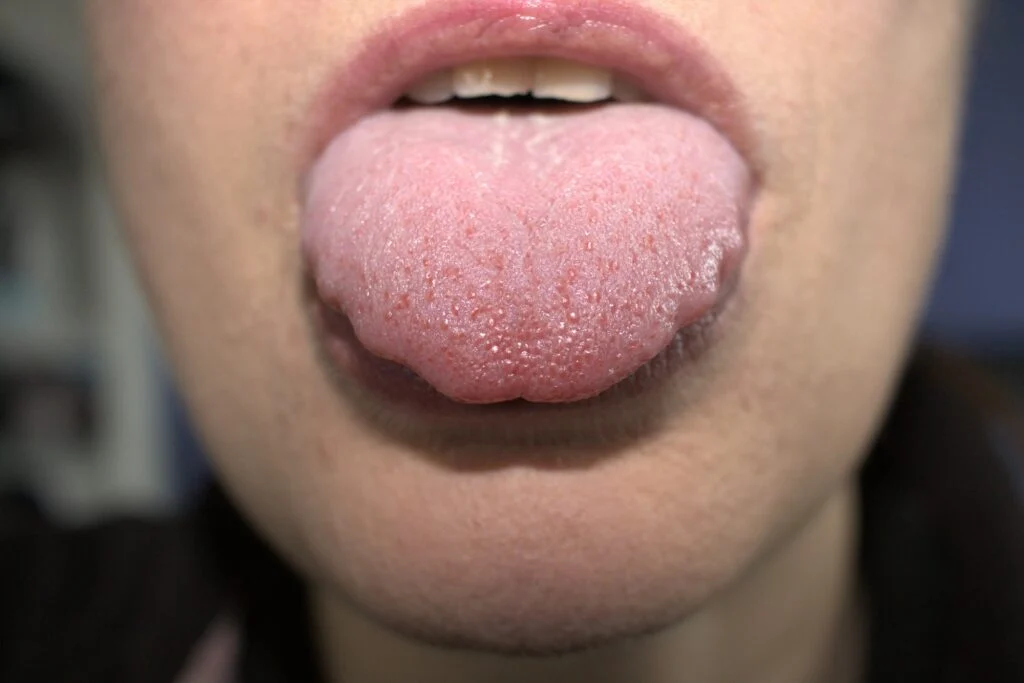
A scalloped tongue is a condition characterized by wavy or rippled indentations along the sides of the tongue. These indentations can vary in depth and size, and they are usually painless. While a scalloped tongue is often harmless, it can sometimes be a sign of an underlying medical condition.
Scalloped tongue is sometimes called rippled tongue, crenated tongue, piecrust tongue, or lingua indenta.
Table of Contents
Common causes of scalloped tongue
Macroglossia (Enlarged Tongue)
This condition can cause the tongue to press against the teeth, leading to scalloping. Macroglossia can be due to genetic conditions, hypothyroidism, or other health issues.
Temporomandibular Joint (TMJ) Disorders
TMJ disorders can lead to habitual tongue thrusting or clenching, contributing to a scalloped appearance.
Nutritional Deficiencies
A lack of vitamins B12, B6, and niacin can affect the health of your tongue and contribute to scalloping. Iron deficiency can cause a condition called glossitis, which can lead to inflammation and scalloping of the tongue.
Sleep apnea
People with sleep apnea may have a scalloped tongue. It’s thought that the effort to keep the airway open leads to tongue and mouth adjustments that cause scalloping.
Habitual tongue pressing
Some individuals habitually press their tongue against their teeth, either due to stress or as a habit, leading to a scalloped edge over time.
Oral appliances
The use of dental appliances, like braces or dentures, can also contribute to the formation of a scalloped tongue if the tongue frequently presses against these devices.
Smoking
Smoking irritates the mouth and contributes to dehydration, both of which can cause a scalloped tongue.
Inflammation or swelling
Any condition that leads to inflammation or swelling of the tongue can cause it to press against the teeth, resulting in a scalloped appearance.
Hypothyroidism
An underactive thyroid can cause swelling throughout the body, including the tongue, which can appear scalloped.
Geographic tongue
This harmless condition causes patches of inflammation and denudation on the tongue, which can give it a scalloped appearance.
Systemic health problems and a scalloped tongue
A scalloped tongue is usually a sign of an underlying condition rather than a disease itself. It’s often harmless, but if you notice changes in your tongue’s appearance accompanied by other symptoms (such as pain, difficulty swallowing, or changes in taste), it’s a good idea to consult a healthcare professional.
Here are some systemic health issues that can be related to or manifest as a scalloped tongue:
- Hypothyroidism: An underactive thyroid gland can lead to a variety of symptoms, including macroglossia (enlargement of the tongue), which can cause the tongue to press against the teeth and create a scalloped appearance. Hypothyroidism can also lead to muscle weakness, fatigue, and other systemic symptoms.
- Nutritional Deficiencies: Deficiencies in essential vitamins and minerals, such as vitamin B12, iron, and folate, can affect oral health and lead to changes in the tongue, including a scalloped edge. These deficiencies can also cause anemia and other systemic symptoms.
- Fluid Retention: Conditions that cause fluid retention, such as congestive heart failure or kidney disease, can lead to a swollen or enlarged tongue, which may press against the teeth and result in scalloping.
- Sleep Apnea: Obstructive sleep apnea, a condition characterized by repeated stopping and starting of breathing during sleep, can be associated with a scalloped tongue. The effort to keep the airway open may lead to tongue and mouth adjustments that cause the tongue to become scalloped.
- Diabetes: Diabetes can lead to various complications, including oral health issues. While a direct link between diabetes and a scalloped tongue is not always clear, diabetes can contribute to conditions like dry mouth and swelling, which might indirectly lead to tongue scalloping.
- Amyloidosis: This rare condition involves the buildup of amyloid proteins in organs and tissues, including the tongue, leading to enlargement and potentially a scalloped appearance.
- Temporomandibular Joint (TMJ) Disorders: TMJ disorders can cause a range of symptoms, including jaw pain, difficulty chewing, and a habit of pressing the tongue against the teeth, which can lead to a scalloped tongue.
Note that a scalloped tongue by itself is not usually a cause for alarm. However, if it’s accompanied by other symptoms or there’s concern about underlying health issues, it’s advisable to consult a healthcare professional.
They can help determine if the scalloped tongue is a symptom of a systemic health problem and recommend appropriate treatment or management strategies.
Diagnosis and treatment options for scalloped tongue
The diagnosis and treatment of a scalloped tongue involve identifying and managing the underlying causes or associated conditions. Since a scalloped tongue can be a symptom of various systemic health issues, a comprehensive approach may be necessary. Here’s an overview of the diagnostic process and potential treatment options:
Scallop tongue diagnosis
- Medical History and Physical Examination: A healthcare provider will start with a thorough medical history and physical examination, including a detailed look at the tongue and oral cavity.
- Blood Tests: Blood tests can help identify conditions like hypothyroidism, nutritional deficiencies (e.g., iron, vitamin B12, folate), and diabetes, which might be contributing to the scalloped tongue.
- Imaging Studies: In some cases, imaging studies like X-rays, MRI, or CT scans may be used to evaluate the jaw, temporomandibular joint (TMJ), and other structures for abnormalities.
- Sleep Study: If sleep apnea is suspected, a sleep study (polysomnography) might be recommended to assess the condition.
- Referral to Specialists: Depending on the findings, referrals to specialists such as an endocrinologist, sleep specialist, or dentist may be necessary for further evaluation and management. They may ask about symptoms, lifestyle factors (such as smoking or alcohol use), and any known health conditions.
Scalloped tongue treatment options
The treatment for a scalloped tongue focuses on addressing the underlying cause:
- For Nutritional Deficiencies: Supplementation and dietary modifications to correct deficiencies in vitamins and minerals.
- For Hypothyroidism: Hormone replacement therapy to manage thyroid hormone levels.
- For Sleep Apnea: Lifestyle changes, CPAP (Continuous Positive Airway Pressure) therapy, oral appliances, or surgery, depending on the severity. (Read more: What Is a CPAP Machine)
- For TMJ Disorders: Pain relievers, muscle relaxants, physical therapy, oral splints or mouthguards, and, in severe cases, surgery.
- For Fluid Retention: Treatment of the underlying condition causing fluid retention, which may include medication to manage heart failure, kidney disease, or liver disease.
- For Diabetes: Managing blood sugar levels through medication, diet, and lifestyle changes.
- General Oral Health Practices: Good oral hygiene, including regular brushing and flossing, can help maintain oral health and potentially reduce the risk of conditions that might contribute to a scalloped tongue.
- Behavioral Modifications: For those with habits that contribute to tongue scalloping, such as tongue thrusting or pressing the tongue against teeth, behavioral therapies or exercises may be recommended.
Scalloped tongue and your teeth
A scalloped tongue, characterized by wavy or ridged edges along the sides of your tongue, often results from the tongue pressing against the teeth. This condition can provide insights into your oral health and the relationship between your tongue and teeth.
Understanding this connection can help in addressing not only the symptoms of a scalloped tongue but also in identifying potential dental issues or habits that may contribute to its appearance.
Here’s how a scalloped tongue is related to your teeth and what it might indicate:
Causes Related to Dental Health
- Teeth Positioning and Crowding: When teeth are misaligned or crowded, they may not provide enough room for the tongue, causing it to press against them and leading to a scalloped appearance. This is often seen in individuals who need orthodontic braces treatment.
- Oral Appliances: Dental appliances such as braces or retainers can affect how the tongue rests in the mouth. If the tongue constantly presses against these appliances, it can lead to scalloping over time.
- Improper Bite (Malocclusion): An improper bite can alter the resting position of the tongue, causing it to press against the teeth more frequently. This includes overbite, underbite, and crossbite conditions.
Impact on Oral Health
- Indication of Bruxism: A scalloped tongue can sometimes indicate bruxism (teeth grinding or clenching), especially if accompanied by other symptoms like tooth wear, jaw pain, or headaches. The pressure from clenching can push the tongue against the teeth, leading to scalloping.
- Potential for Oral Discomfort: If the tongue frequently presses against the teeth or dental appliances, it may lead to discomfort, soreness, or even changes in speech patterns.
- Sign of TMJ Disorders: Temporomandibular Joint (TMJ) disorders can lead to a range of symptoms, including a scalloped tongue, due to changes in how the jaw and tongue function together.
Treatment and Prevention
- Orthodontic Solutions: For issues related to teeth alignment or bite, orthodontic treatments like braces or Invisalign can help correct the underlying problems, potentially reducing the scalloping of the tongue.
- Mouthguards for Bruxism: Custom-fitted mouthguards can protect the teeth from grinding and clenching at night, indirectly addressing the cause of the scalloped tongue.
- TMJ Treatments: A range of treatments, from physical therapy and exercises to dental splints, can help manage TMJ disorders and alleviate the pressure on the tongue.
- Behavioral Changes: Being mindful of tongue positioning and avoiding habits like pressing the tongue against the teeth can help. In some cases, speech or physical therapy may be recommended to alter these habits.
- Regular Dental Check-ups: Regular visits to the dentist can help identify and manage any dental issues that might contribute to a scalloped tongue, ensuring both oral health and the well-being of the tongue.
FAQ
Is scalloped tongue dangerous?
A scalloped tongue itself is not typically dangerous but can be a sign of underlying conditions that may require attention. It’s important to consider other symptoms and consult a healthcare professional to determine if there’s a need for treatment of an associated health issue.
Why does Hypothyroidism cause scalloped tongue?
Hypothyroidism can lead to a scalloped tongue because it often causes the tongue to enlarge, a condition known as macroglossia. When the tongue becomes too large for the mouth, it presses against the teeth, creating indentations or scallops along its edges. This enlargement can be due to the accumulation of substances like glycosaminoglycans, which attract water and cause swelling, a common symptom of hypothyroidism.
Fact Checked
Our dedicated team rigorously evaluates every article and guide to ensure the information is factual, up-to-date, and free of bias.
Updated Regularly
We update our articles and reviews regularly to ensure you have access to the latest data in the dental industry.
The content on Dental3DU’s blog is intended for educational purposes only. This information should not be relied upon as professional medical counsel. Be sure to always consult with your dentist about the dangers and benefits of any medication, treatment or procedure.

